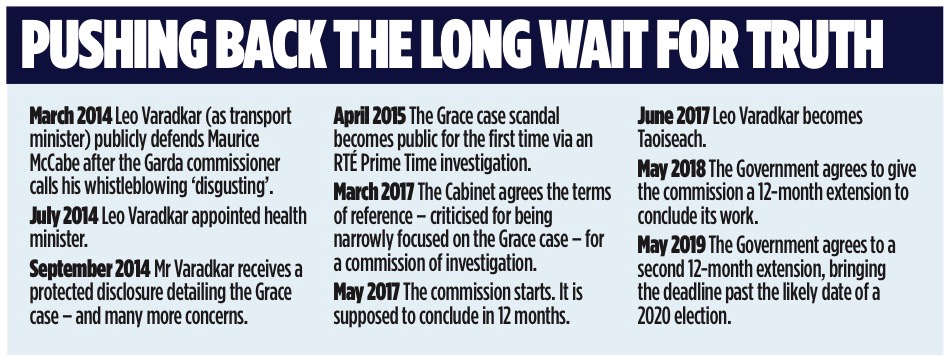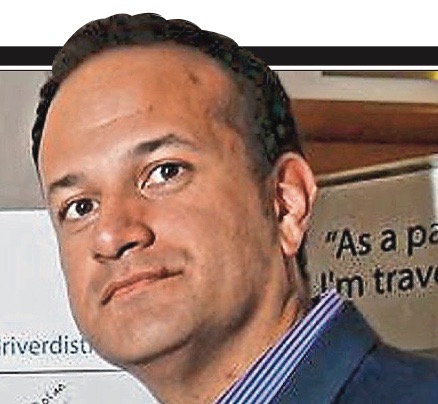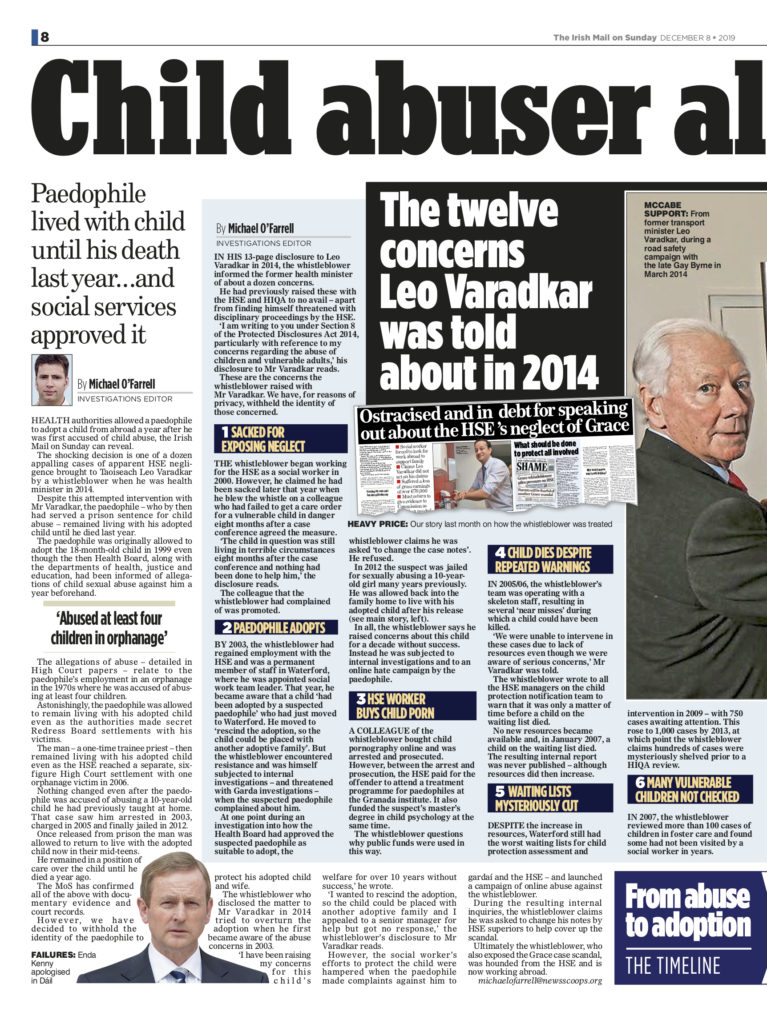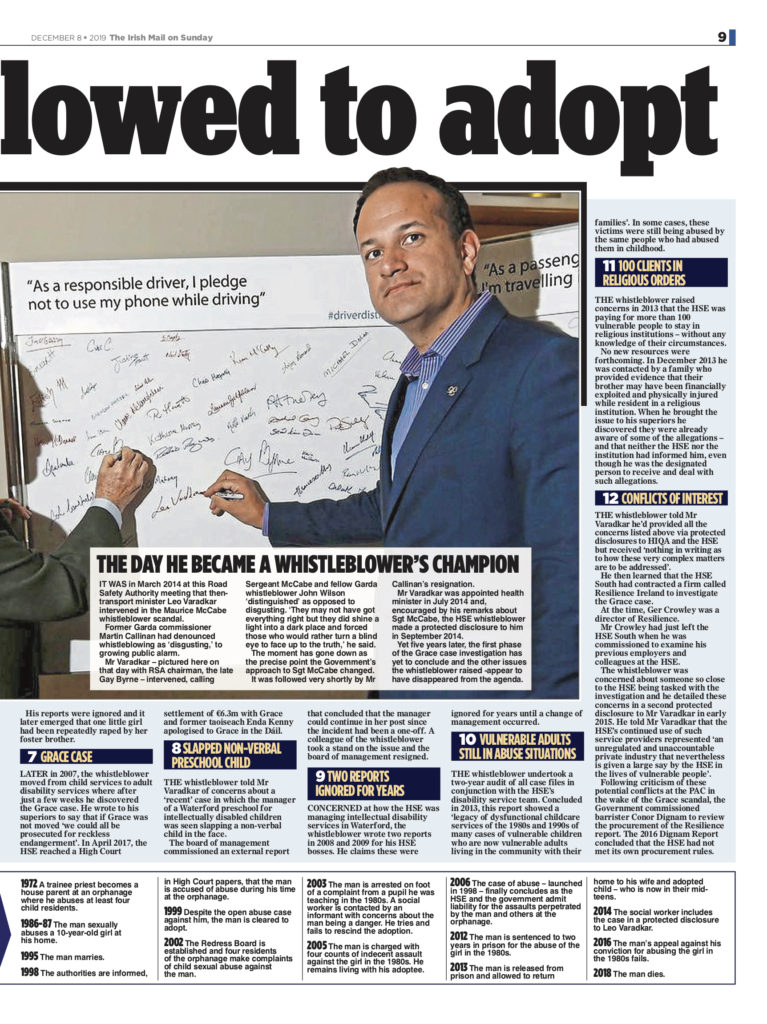By: Michael O’Farrell
Investigations Editor
THE HSE whistleblower who first brought the Grace case to the attention of Leo Varadkar has accused the Taoiseach of not doing enough to protect other at-risk people he was told about.
In addition to the Grace case, the whistleblower informed the Taoiseach about many other horrifying cases of neglect in a protected disclosure, dated September 2014, when Mr Varadkar was facing his first Dáil term as health minister.
The disclosure informed Mr Varadkar that the same HSE officials responsible for leaving Grace in the care of a foster family for decades, despite allegations of physical and sexual abuse, had also:
- Allowed a paedophile to adopt and raise a child.
- Allowed a child who was in danger to die despite written warnings to HSE bosses.
- Paid for a HSE employee to do a master’s degree in child psychology when he had pleaded guilty to child-porn offences.
- Left vulnerable adult victims living with people who had been abusing them since childhood.
- Allowed a pre-school manager, who slapped an intellectually disabled, non-verbal child in the face, to remain in her post.
- Failed to protect scores of at-risk children identified in internal reports.
The disclosure was also the first time Mr Varadkar was informed of the Grace case – more than six months before it hit the national headlines.
Mr Varadkar was also told that the HSE appeared completely ignorant of care deficiencies and risks faced by more than 100 vulnerable adults being cared for by a religious order.
In a 2015 meeting with the whistleblower, Mr Varadkar was shown photos of the injuries one resident had suffered. He was told of fears about the financial abuse of this vulnerable person, which the whistleblower reported to gardaí.

Former taoiseach Enda Kenny apologised to Grace in February 2017, telling the Dáil ‘her treatment was a disgrace to us as a country’.
A commission of investigation was later established in May 2017 headed by barrister Marjorie Farrelly. But five years on from his disclosure to Mr Varadkar, the whistleblower fears all the issues he raised – except the Grace case – have yet to be acted upon.
Ostracised from the HSE because of his disclosure, the whistleblower told the Irish Mail on Sunday he ‘expected a very different response from Minister Varadkar in 2014/15’.
‘I believed that he would consider:
1) Where are these children and vulnerable adults now? Are they safe? What do we need to do to support them? ‘
2)Is anyone investigating these alleged perpetrators? Is anyone else at risk? What investigations should we pursue? Should I call the gardaí? Why no HIQA response?
‘3) What is going on in the HSE South? Did these services ever turn themselves around or are these the same systemic failures as before?
‘The whistleblower said his decision to come forward had been ‘devastating’ for him and his family: ‘I was forced to leave my HSE job and find work in England; then forced to work unpaid for a year for the Farrelly Commission, reading and learning tens of thousands of pages of documentation, so I could be cross-examined under oath for months.
‘Even this would have been worth it if I felt it had improved the safety of my social work clients, or done something to address the pain of their families.’ As a result of his experience, the whistleblower called for a review of whistleblowing legislation.
‘Until whistleblowers are protected, anyone considering raising a concern should know that a moment’s work for a minister, can lead to years of legal entanglement for those who care enough, or dare enough to speak out,’ he said.
He also called for a review of commissions of investigation laws, citing his experience before the Farrelly Commission, established three years after his disclosure to Mr Varadkar.
But the terms of reference for the commission leave little room for the other concerns raised by the whistleblower to be addressed.
Instead, its first phase – which was to be completed in 12 months – is exclusively investigating how Grace was left at risk for decades at a foster home where there were ongoing abuse concerns.
Once this is completed, the commission’s second phase will focus on the circumstances of the 46 children who were at different times housed in that foster home.
But now, two-and-a-half years into what was to be a year-long phase one, there are concerns over how long the commission is taking.
Already the Government has, at the request of the commission, granted two 12-month extensions.
That means phase one of the commission’s work will not be concluded until at least May 2020 – after an expected general election early next year.
Last night Fianna Fáil’s John McGuinness – who as Public Accounts Committee (PAC) chairman in 2015 – was instrumental in bringing the Grace case to light, said he was truly shocked at today’s revelations.
Regardless of the other concerns raised by the whistleblower in 2014, Mr McGuinness said he found it extraordinary that Mr Varadkar had known of the Grace case but did not act on the information until after the case became public via the media and the PAC.
‘To hear that the Taoiseach today knew at that time is a shocking revelation in itself.
‘He should come before the Dáil and explain himself,’ said Mr McGuinness.
‘I was very disturbed after the Grace case. To think that someone who was in a far greater position of power than I was examined this and didn’t have it investigated immediately – you couldn’t forgive someone for doing that.’
Mr McGuinness said the people who had been abused deserved better from the Taoiseach.
‘As a politician and a leader and a person in power he had a responsibility to find the truth,’ he said. ‘And if he ignored that responsibility or brushed over it in any way then he has a case to answer. You can’t be given that information and not do something about it. You have to make it public and you have to find the truth. It’s shocking he knew all of that and really sat on it.
‘That tells you an awful lot about politics, leadership qualities and the State – because if he knew it others knew it.’
Current PAC chair Seán Fleming was also critical of Mr Varadkar’s handling of the 2014 disclosure: ‘This questions the approach of Leo Varadkar as to who he chooses to give support to and those he chooses not to take a personal interest in,’ he said.
‘He was fully supportive of Maurice McCabe because that was in the public arena at that stage but with these cases they were not in the public arena and there was no bandwagon to jump on.
‘He [says] what he thinks people want to hear and whether or not there is any follow through or substance is neither here nor there.’ The MoS asked the Taoiseach about each of the dozen concerns the whistleblower raised with him.
In response, a spokesperson said that Mr Varadkar – and former junior health minister Kathleen Lynch – had dealt with the whistleblower’s protected disclosure ‘very effectively’ by setting up the Farrelly Commission of Investigation.
The Taoiseach’s office did not address the whistleblower’s concerns that the commission is focusing solely on the Grace case, with the other concerns yet to be dealt with.









